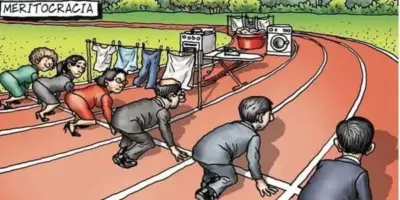The forthcoming Women’s Day gives me another opportunity to talk about raising awareness of our enculturation.
Celebrations and ceremonies, in all societies and cultures, often have an enlightened meaning. But in many cases they merely perpetuate a passive enculturation without offering any practice of enlightened discernment or intellectual emancipation.
I’m not particularly fond of celebrations, I very rarely celebrate anniversaries, but I often paid particular attention to this so-called ‘Women’s Day’.
However, I no longer celebrate it because it has too many connotations of gender assignment.

There was a time when I was taking this invitation to celebrate the female gender very literally. As my thinking was imbued with feminism, it was important for me to pay attention to it. But over the years my thinking has evolved.
The main evolution is not linked to readings, but more to personal awareness. My practice of the Feldenkrais Method is of course part of this, but it is enriched by my awareness of my attitudes on a daily basis.
It has also been enriched by the positions I’ve taken and the things I’ve said in contradiction. I no longer contradict out of anger nor out of desire to prove that I’m right, but with full awareness.
I have very little influence on the way the world works and I have no illusions about my ability to influence any particular change. But I refuse to stop myself from commenting or contradicting, because ‘Who says nothing, consents’. And I do not consent, I do not abdicate, in the face of injustice, whatever its form. I give myself the right to express my disapproval or my anger, because “Who says nothing, consents”.
Will there be a day when we will live in a world in which we will no longer have to distinguish between men and women, in which these two words will be banished from dictionaries?
A world in which we no longer have to say Mr or Mrs when we address someone?
A world in which we would have other choices than mentioning “he” or “she” when we write?
If such a world ever exists, it’s more than likely, given my age, that I’ll never have the opportunity to savour either its atmosphere or its benefits!
Unlike male and female, which are objective qualifiers linked to natural attributes, Man and Woman are merely social constructs. Our natural attributes do not define us as men or women, and even less so as people. But society, culture, education, what we call our enculturation, does that for us.
Does this mean that we should surrender ourselves to it, succumb to it or conform to it?
Does this mean that we should abandon the idea of answering, for ourselves and by ourselves, this question “What do we do with what has made us who we seem to be?“
What Jean-Paul Sartre expressed with:
“The important thing is not what has been made of us, but what we ourselves make of what has been made of us”.
in “Saint Genet, comédient et martyr” (1952)
My aim here is not to envisage a warlike resistance, or an opposition driven by anger, but to become aware of how this cognitive bias leads us, confines us to a system of thought, and ultimately prevents our emancipation.
I’d like to talk about this subject without using the word “man” or “woman”, because, as you already have realised, they are very simplistic. But in what follows, I’m going to use them, fully conscious of their imperfection and aware that they are only constructed definitions and in no way reflect a natural reality. But also, because today I have no other vocabulary…
It goes without saying that, whatever our (assigned) gender is, we all have a ‘feminine’ part and a ‘masculine’ part.
Using these social qualifiers, we can say that each of us, whatever our gender assignment, has a feminine and a masculine part within him or her. Each to varying degrees and proportions. This is just because nature is like that, whether in the animal or plant world, nothing is white, nothing is black, nothing is symmetrical, nothing is finite, nothing is defined…
If you ask me if I feel more like a woman or a man, I’ll tell you that I don’t know.
These concepts have no existence or space in my emotions or feelings. I have male genitalia and I’m attracted to female genitalia, that’s a fact, but I don’t recognise myself as either a man or a woman.
So, in a perfect world, I wouldn’t talk about Women’s Day. However, nowadays, it is an indisputable fact that in almost every society or culture, women are discriminated against and far from being treated on an equal footing with men.

If we want to try to reduce injustice, we need to tackle this cognitive bias that affects us all, and men in particular. Because we men are, consciously or unconsciously, the source of the suffering caused by this gender enculturation.
As “men”, if you want to live as mature and free beings, if we feel concerned by this arbitrariness, we need to focus our attention on the implications of these gender biases and become aware, in all situations of life, of our behaviour and actions in which we do not behave as beings who value sex and gender equity.
If we want to emancipate ourselves from this negative and destructive enculturation, we must first become aware of it in every moment of our lives.
This is a daily mental exercise that is both enriching and intellectually very advanced.
Awareness exercises, whether they are called introspection, meditation or Awareness Through Movement, cannot be reduced to exploring our emotions or our physical or mental well-being.
They must also include awareness of our enculturation biases, because they define our actions as much as our emotions and feelings. What’s more, they can go so far as to influence or distort our feelings and emotions.
So rather than thanking, complimenting or cajoling, for a day, those who have been labelled as ‘woman’, I suggest that we (those who have been labelled ‘man’) pay particular attention to all our habits, tics and behaviours that are at odds with our values of fairness.
For example, I’ve given up using ‘Sir’ or ‘Madam’ when I’m addressing someone. When I say hello, I simply say “Hello”, I am no longer saying “Hello Madam” (I long ago abandoned the use of “Miss”, which is even more discriminatory). And, to my great surprise, I realised how much this was changing the experience of meeting and interacting with that person.
Here are a few examples of awareness-raising practices, which can be part of everyone’s daily life, and that you don’t need to go to a class or call on a facilitator to try out and practise.
When you’re interacting with someone, remember to hold your tongue and focus your attention on yourself, bringing all or some of these questions to your awareness:
And of course plenty more…

So, rather than celebrating a Women’s Day that, in some ways, only perpetuates this blind enculturation, rather than making this celebration an ephemeral, highly biased appreciation of women, let’s make this Day the Day to awaken men’s consciences!

不要忘记查看我们即将举行的活动和课程的日历。
Don’t forget to check the calendar of our upcoming events and classes.
